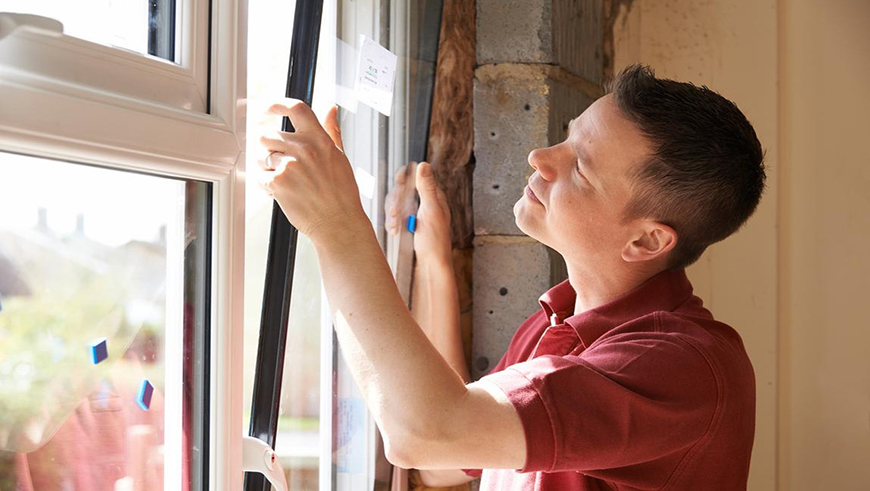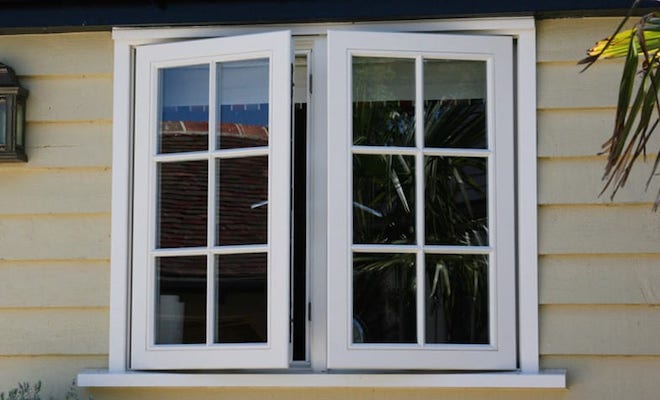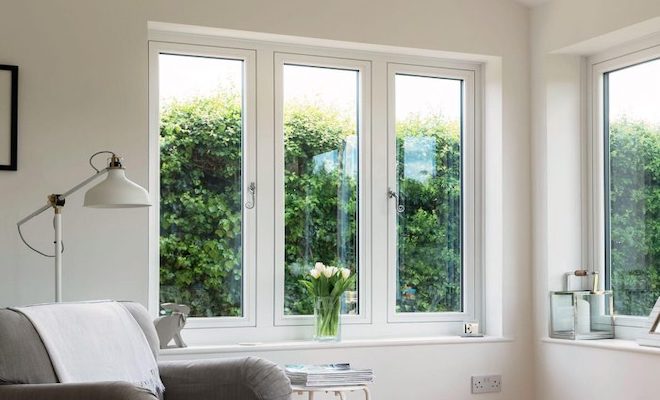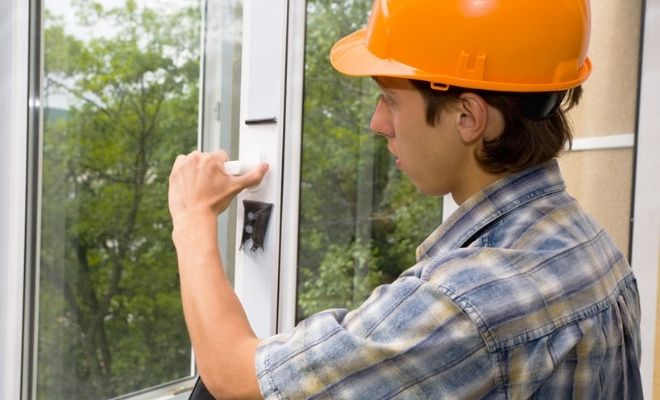Window Fitter Prices
Last updated 22nd May, 2025
This article is a comprehensive guide to UK window fitter prices and will include the average costs. With the average cost of fitting a new window at roughly £400 per window, the cost of replacing windows can quickly mount into the thousands for any house with three or more rooms to fit.

Table of Contents
Window Fitter Jobs
Windows are among the most important features of any property, both in terms of their practical functions and their effect on the look and feel of a home. The windows' style and condition will also have a significant influence on the value of a property.
There are many types of window fitter jobs, and the price of your window fitting will vary according to the window's size, the type of the window being fitted and the style of window fitting you may need.
This means that each window on each building requires a unique fitting. As you would expect, there is a wide variety of windows available that window fitters usually group into categories.
These categories may differ between fitters or fitting companies, but broadly windows are separated according to style, material and glazing.
Fitters will usually measure the size of the window in millimetres (mm). This measurement will include the frame and depth of the window's opening.
Casement Windows
Casement windows are hinged to a frame and usually open outward away from the building. As a general rule, casement windows tend to be cheaper than sash windows and can be designed to suit virtually any property style.
The cost of installing a casement window can range from around £200 for a 1000x500 uPVC frame, to £1,500 for a 1200x1200 wooden frame. The average costs of installing a casement window, including materials, labour and VAT are as follows:
| MATERIAL | AVERAGE COST |
|---|---|
| uPVC | £150-£900 |
| Aluminium | £540-£960 |
| Wooden | £700-£1,500 |
Sash Windows
Sash windows open by sliding either up and down or from side to side, and as a general rule tend to be more expensive than casement windows. The price of fitting a sash window will vary according to its style and the number of panes required.

The average cost of installing a sash window can be anywhere between £480 and £1,000 per window. The average prices you can expect per window including materials, labour and VAT are as follows:
| MATERIAL | AVERAGE COST |
|---|---|
| uPVC | £700-£1,100 |
| Aluminium | £1,200-£1,500 |
| Wooden | £1,100-£1,900 |
Bay Windows
Bay windows project outward from the building, sometimes forming a semi-circle known as circle bay windows. Some styles form a curve with four or five openings known as bow windows. Occasionally bay windows form a box shape with flat sides protruding out of the wall known as box windows.
The price of bay windows depends on the number of panels required and the material used for the frame. but you will generally pay from £1,050 - £1,350 for three panels white uPVC to £1,900 - £2,700 for five panels woodgrain uPVC.
| MATERIAL | AVERAGE COST |
|---|---|
| uPVC | £1,050-£1,350 |
| Woodgrain uPVC | £1,900-£2,700 |
Tilt and Turn Windows
Tilt and turn windows feature a hinge mechanism which means they can either be opened fully like a casement window (inwards). They can also be tilted from the bottom so that the top of the window is angled into the room, giving a smaller opening for ventilation.
The style is popular due to the practical versatility the window offers, including its weatherproofing and security options.
uPVC tilt and turn windows are marginally more expensive than casement windows of the same material. You should expect the average cost of a tilt and turn fitting to be between £450 - £500 (800x800) uPVC and £650 - £700 (1200x1200) uPVC.
| MATERIAL | AVERAGE COST |
|---|---|
| uPVC | £450-£500 |
| Aluminium | £650-£800 |
| Wooden | £500-£700 |
Cottage Windows
Cottage windows are common features of older, traditional properties and are also known as Georgian or Tudor windows.
They can open either as sash or casement but tend to be marked out by a series of bars that make several small squares of glass rather than one big pane.
Original cottage window installations can be draughty, and the wood tends to warp with age. You should expect the average cost of fitting a new cottage window according to size and material to be as follows:
Casement
| MATERIAL | AVERAGE COST |
|---|---|
| uPVC | £200-£925 |
| Aluminium | £500-£1,000 |
| Wooden | £600-£1,500 |
Sash
| MATERIAL | AVERAGE COST |
|---|---|
| uPVC | £600-£1,000 |
| Aluminium | £1,000-£1,500 |
| Wooden | £1,000-£2,000 |
Roof Window
The cost of materials will be fairly consistent and will almost always account for the greater part of the cost of any window fitting. The most significant variant in the cost of a roof window replacement is likely to be the labour involved, including the complexity of the job, ease of access and length of time.
Roof window replacement will almost always involve scaffolding, the charge for which should be included in any quote.
The cost of scaffold hire can range from around £300 to around £1,000 per week. The added cost of scaffold hire for a roof window replacement will start from around £40 and will not usually exceed £120.
Excluding the cost of scaffolding, you can expect the average cost of a roof window replacement to be as follows:
| MATERIAL | AVERAGE COST |
|---|---|
| Skylight | £500-£700 |
| Roof dome | £450-£650 |
| Velux | £550-£800 |
Single Glazed Windows
Single glazing is now rarely recommended due to its energy inefficiency; however, traditional single glazed windows are still a feature of many older houses. The cost of replacing a single pane of standard glass will not typically exceed £100 - £150, though the price will rise if scaffolding is required.
Double Glazed Windows
The cost of fitting a double-glazed window will vary according to the energy rating/quality of glass with A++ the highest rating. Refurbishing windows will be cheaper than a full replacement and will typically cost around £200 per unit.

With all the variants involved, the average cost of a double-glazed uPVC window (2000x2000mm) will be £300 - £400 for a casement window, £600 - £800 sash and £500 - £600 for a tilt and turn.
Triple Glazed Windows
Triple glazed windows will typically cost between 20% and 30% more than double glazing, with the average cost of fitting a standard uPVC triple glazed window at around £565.
These prices, you must expect to rise with aluminium and with wood frames and according to the quality of glass selection.
Emergency Window Fitter Prices
One of the most common window fitting jobs is repairing or replacing broken and smashed windows in an emergency. As a damaged window is a security issue, emergency fitters are usually available 24 hours a day.
When hiring a window fitter in this instance, they will usually arrive within 24-hours, although some companies may offer a one-hour emergency service.
If you are also concerned over security following a broken window, you may also wish to consider having your window and door locks changed
.
In an emergency a rough estimate will be provided over the phone, or an instant price upon arrival. The average repair costing between £50 and £200, although this can vary considerably depending on the nature and locality of the job.
What’s included:
- Repair/replacement of broken or smashed windows
- Boarding-up service if needed (often via a locksmith)
- Lock, handle, and hinge repairs
If a window needs to be entirely replaced rather than repaired, it may not be possible within 24 hours and require the fitter to attend the job twice.
Window Fitter Hourly Rate
Fitters tend to work to an hourly rate, but that rate will not typically determine the job's final cost as additional factors may apply, such as the complexity of the type of window being fitted.
Most window fitters will therefore break down the overall cost of a job into the materials, labour, and VAT costs. While they often issue the quote as a flat rate for a job, understanding the hourly breakdown can help you compare prices.
| Location | Hourly Rate | Notes |
|---|---|---|
| Outside London | £20/hr | Most jobs require two fitters working together |
| London and South East | £25/hr | Will often charge a minimum of half-day |
As a rough guide, replacing and fitting a new double-glazed window takes on average 30-45 minutes, with an experienced fitter able to fit around six windows a day.
Window Fitter Daily Rate
If you are looking to have three or more windows fitted at the same time, the job is more than likely to be charged by a day rate. Although this figure doesn't vary drastically nationwide, as with the hourly rate it can be higher within London and the South East.
| Window Type | Daily Rate | Notes |
|---|---|---|
| Standard jobs | £150/day | National average for most window types |
| Single-hung | £100/day | Installation is less labour-intensive |
| Bay windows | £200/day | Complex fitting due to size and structure |
Window Fitter Qualifications
Window fitters can legally trade without any official qualifications. However, window fitting is a skilled and competitive trade, so companies are keen to avoid poor and unsafe work or fraudulent practices.
Most window fitters will possess a qualification in one of the following:
- Fenestration Installation
- Fenestration Self Assessment Scheme (FENSA) Membership
This means that a fitter can certify that a replacement window installation complies with appropriate Building Regulations.The customer is given a Building Regulations completion certificate, and the installation details are entered into the FENSA central database.
Customers are also advised to look for certified qualifications or experience when hiring for specialist jobs such as bay windows and cottage windows.
Window Fitter Insurance
A window fitting is essentially a permanent alteration to property involving security, energy efficiency, and affecting the property's overall value. Window fitters do not have to be insured to legally carry out general work.
However, window fitting companies may be held liable for any accidents or damage they cause, so will usually be covered by public liability insurance.
This means the company will be covered against accidents or damage caused by the company or its contractors. Individual fitters can also be covered by public liability insurance as sole traders.

If an accident and or damage is caused by a company while carrying out uninsured work, the customer entitled to pursue legal damages against the company.
The legal process can prove expensive for both the customer and company, so it is strongly advised on all sides that professional work is never carried out without the appropriate insurance in place.
DIY vs Professional Window Fitting
While it's largely recommended to always a hire a professional window fitter, it is possible for someone experienced in the appropriate DIY to carry out the work themselves. Below we take a look at the pros and cons of both.
DIY Window Fitting
You shouldn't attempt to replace a window yourself unless you are confident in your ability to do so, as well as having the correct tools and materials for the job.
Pros:
- As with any DIY job, carried out correctly and it can prove cost-effective due to saving money on labour fees
- Flexibility allows you to work on your own terms, while in full control of the timeline, materials and how you approach the fitting
- Once you've completed a window replacement, the satisfaction and confidence can be applied to other big tasks
Cons:
- Mistakes can include taking incorrect measurements, or poor sealing can potentially lead to drafts, water leaks or damage to your property
- What may look like a quick and easy job can soon become frustrating and time-consuming
- Fitting windows can be dangerous, and doing so DIY may not meet the required building standards
Professional Window Fitting
Hiring a professional window fitter is often the sensible and more practical solution. Especially when you don't have the right DIY experience or the project is more complicated than anticipated.
Pros:
- Experts who fit windows for a living are more likely to do the job properly and more efficiently than DIY
- Reputable window installers will always ensure building regulations and energy efficiency standards are properly adhered to
- During the fitting, the correct safety precautions will be taken, along with the right tools for the job
Cons:
- The cost will be much higher due to the additional labour charges
- Work can take time, especially when fitting several windows at once
- Reliant on if or when the window fitter is able to schedule your job
Conclusion
While DIY window fitting can prove satisfying and save you money, professional window fitting may come at a cost but it will help ensure the windows are fitted safely and correctly.
If you are attempting to fit the windows yourself, but in any doubt over your ability, then hire a professional based on their experience and any previous customer feedback.
FAQs
The price per window will usually be detailed in the final cost breakdown, but fitters will almost always charge per hour, per half-day and per day.
To find out if you are eligible for a grant go to the Gov.UK website .
If fitting a window yourself, materials will make up the bulk of the cost, but you will more than likely require tools best suited for the job. Before deciding, consult a DIY builders guide and bear in mind that tool hire is an option for reducing costs.
You may have to call on professional fitters in order to resolve any mistakes made in the fitting, which depending on the nature of the problem, can lead to a considerable increase on the initial cost.
Although you will not usually require permission to fit or replace windows as a homeowner unless it is work on a listed building, you should consult the local planning authority if carrying out DIY window fitting to be safe.
These problems are unlikely to occur where credited, experienced professionals carry out the work, but very common to DIY fittings.
A standard window fitting will usually be completed in around 45 minutes, but more complex jobs, such as bay windows, can take more time.
The job can be messy, but most fitters will include a clean-up and waste removal service in their standard pricing, as they are obligated to remove potentially dangerous materials.
How to Find and Hire a Window Fitter You Can Trust
Poor window fittings can cost energy, spoil your home's comfort and beauty, and compromise your security. As with any building work, it is important to ensure that you hire fitters that you can trust with the job.
The best way to find fitters is to consult an established trades website as they will carry the information on experience and accreditation you will be looking for in order to make your hire.
Most sites will also offer the opportunity to compare quotes enabling you to make an informed choice.
Here's a quick checklist on what to look out for when hiring a window fitter:
- Check that they are FENSA approved
- Check for accreditations such as NVQs and GQAs
- Check that the fitter is insured, either through the company or as a sole trader
- Check for previous customer reviews which can usually be found on trades website or on the fitter's own website
- Look at the previous experience of the fitter, paying attention to whether they have experience with the specific job you are hiring
- Be sure to compare at least three quotes in order to get an idea of reasonable pricing










